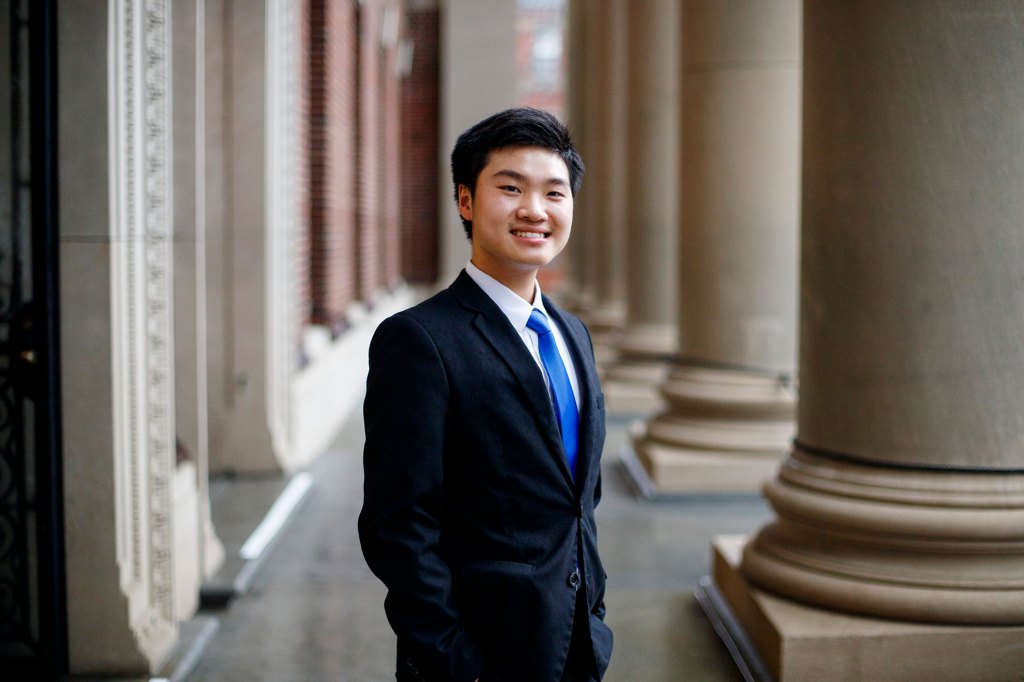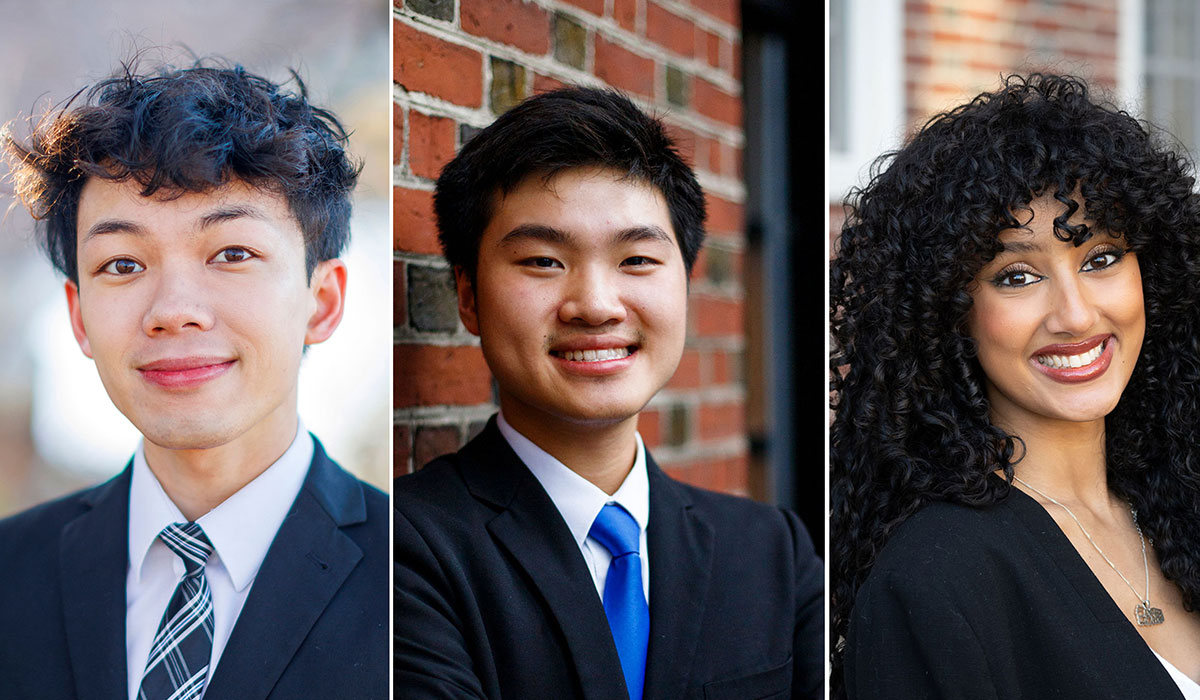Three Harvard students will take their passions for journalism, health equity, and education equity to the United Kingdom next year as members of the 2025 Marshall Class. Ryan Doan-Nguyen, John Lin, and Laila Nasher are among 36 students nationwide to receive 2025 Marshall Scholarships, which support two years of study at a U.K. college or university.
Ryan Doan-Nguyen
Joint concentration in History & Literature and Government, with a secondary in Ethnicity, Migration, Rights
Doan-Nguyen ’25, of Westborough, Massachusetts, strives to bridge research, writing, and advocacy in journalism and history. Having grown up listening to his family’s stories about fleeing the Vietnam War as refugees, he is passionate about amplifying marginalized voices in his work. His senior thesis includes oral history interviews with 40 Vietnamese refugees impacted by imperialism.
“There’s so much knowledge and innovation and ways of thought and approaching the world that are excluded because of the way in which we value certain voices more than others,” Doan-Nguyen said. “I’m trying to help break that down in the work that I do.”
The night the Mather House resident learned that he had been named a Marshall Scholar, he ran straight to his roommate to share the good news. Then he called his family and his closest mentors.
“It’s the chance of a lifetime, and I did not expect to receive it in the slightest,” Doan-Nguyen said. “I just remember receiving the call and being so overwhelmed with gratitude.”
Doan-Nguyen is a Mellon Mays Undergraduate Research Fellow, an editor for The Harvard Crimson, and co-founder of a Harvard chapter of the Asian American Journalists Association. He served previously on the JFK Jr. Forum Committee at Harvard Kennedy School and on the board of the Harvard Vietnamese Association.
Doan-Nguyen plans to attend the University of Oxford, where he will study global and imperial history the first year and U.S. history the second year.

John Lin
Human Developmental and Regenerative Biology; secondary in Global Health and Health Policy
Lin ’25, of Boston, wants to know what different rare diseases have in common, and what factors link them together.
As a member of the Greka Lab at the Broad Institute of MIT and Harvard, Lin studies how cells harness cargo receptors to recognize, degrade, or trap misfolded proteins. He has investigated how cargo receptors regulate disease severity in a rare kidney illness and is applying his findings to other rare diseases.
“We’re finding that if you target these cargo receptors, you can clear misfolded protein in each of these diseases, suggesting that these different misfolded proteins are trapped through this common mechanism,” Lin said. “Just by targeting these common pathways, you can resolve many different rare diseases.”
Lin is also interested in using science journalism to make information more accessible to the general public. The Currier House resident said he became passionate about health equity after seeing his parents, working-class immigrants from China, face linguistic and economic barriers in accessing care.
“Even though I was really interested in solving these diseases and at the most direct level through research, I realized through observing my family’s experiences that it’s not just discovering the science that’s important but also getting the science to the people who are impacted by it every day,” Lin said.
Lin was swimming in the Malkin Athletic Center pool when the call came that he had been named a 2025 Marshall scholar.
“I was really surprised,” said Lin, who immediately phoned his mom to share the news. “I’m very, very grateful for the opportunity.”
Lin is co-president of the Harvard Global Health Institute’s Student Advisory Committee and an associate magazine editor for The Crimson. He also works for the Harvard Ed Portal mentoring youth from Allston-Brighton.
Lin plans to spend his first year as a Marshall Scholar studying biological sciences at the Wellcome Sanger Institute for genomics research at the University of Cambridge, and his second studying medical anthropology at the University of Oxford.

Laila Nasher
History and Anthropology; secondary in Ethnicity, Migration, Rights
Nasher ’25 wants education to be a protected American right for all students. A first-generation college student, Nasher said that coming to Harvard after attending public school in her low-income neighborhood in Detroit fueled her desire to make change.
“For me it was the question of, why not us?” said Nasher. “Why did I and why did the people in my community never have these types of educational opportunities that are and should be the norm?”
A joint concentrator in History and Anthropology, with a secondary in Ethnicity, Migration, Rights, Nasher found her passion for history in her first year in a course on the modern Middle East that “completely opened” her mind to a subject matter that felt “so much bigger” than herself. A Truman Scholar and a Mellon Mays Undergraduate Fellow, Nasher focuses in her research on the history of feminism in South Yemen before and after independence from the British, and after unification with North Yemen.
Nasher was in her Mather House dorm room when she got the call that she had received a Marshall, and immediately celebrated the news with her roommate.
“I was just in shock and very, very grateful,” Nasher said.
On campus, Nasher founded the First-Generation Low-Income Task Group, served on the board of Primus, and was co-director of diversity and outreach for the Institute of Politics. Off-campus, she interned with Congresswoman Rashida Tlaib and the Tawakkol Karman Foundation in Istanbul, and organized with the Michigan Education Justice Coalition.
She’ll spend her first year as a Marshall Scholar studying education at the University of Oxford, where she plans to do a comparative study on how primary and K-12 education systems in the U.K. and the U.S. shape the experiences of people in low-income, urban Yemeni communities. She is undecided on a pursuit for her second year.
Source link

